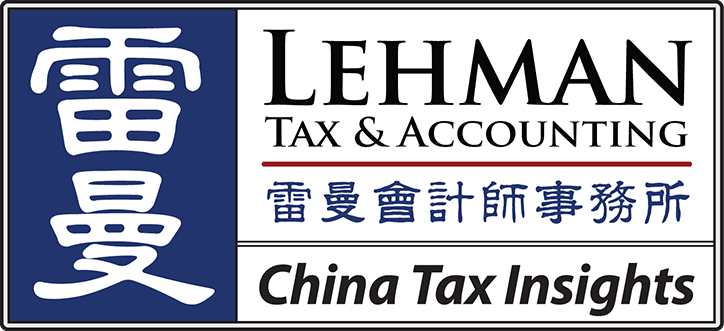

|
|
|
|
LEHMAN, LEE & XU
|
|
June 2011
|
|
|
| China to halt wind turbine subsidies |
|
Companies say move will have negligible effect |
| Tax-free Tianjin zone touted |
|
Municipality aims to stimulate local economy through rebates (China Daily) |
| Municipality aims to stimulate local economy through rebates |
|
BEIJING - Tianjin is joining a number of coastal cities, including Shanghai and Shenzhen, that have announced their plans to set up the country's next tax-rebate zone. That's after the tropical Hainan Island was given the green light to provide tax-refunds on products in April.
In the city's three-year plan, the Dongjiang Free Trade Port Zone of Tianjin will be transformed into a tax-free island offering tax refunds to tourists, once its application has been approved, according to Huang Xingguo, mayor of Tianjin, who was quoted in the Securities Daily on Saturday. The zone, located at Binhai New Area, a government-designated economic zone 45 minutes' drive from downtown Tianjin, is the country's largest bonded port by size. Situated adjacent to Beijing and Tianjin, where consumption is robust, the proposed tax-free zone would be easily distinguishable from non-tax-free areas. It also has existing advantages in logistics and other facilities, Yu Rumin, chairman of the board of Tianjin Port (Group) Co Ltd, told the newspaper. Tax-free luxury goods available to increasingly affluent Chinese within the country have created many opportunities for tourism and retail services. China is poised to become the world's largest market for luxury goods by 2020, according to a report from the brokerage and investment group CLSA Asia-Pacific Markets in February. The country will account for 44 percent of global sales over the next decade, up from 15 percent at present, the report said. Experts believe that tax rebate policies in more designated sites will stimulate domestic demand. Eyeing the profits from tax-free retail businesses, the country's financial hub Shanghai was reported in May to be working on plans to make its Pudong New Area District a tax-free zone. Coastal port cities such as Zhoushan in Zhejiang province in the east of the country, and Zhuhai and Shenzhen in Guangdong province in the south, have also prioritized a tax-rebate plan to fuel tourism and their local economies. Hainan Island, the first province to implement a program of tax rebates, had seen about 40,000 tourists granted rebates on around 150,000 products by May 20. The island has set a rebate cap on goods priced at no more than 5,000 yuan ($772) for each person for each visit from designated shops. The policies apply to tourists from both home and abroad who fly on to other destinations in China from the island. Each traveler can claim a rebate twice a year, while residents of the island can claim once a year. The program, based on similar programs at Jeju Island in South Korea, and Okinawa, Japan, echoed the State Council's goal to build Hainan into a top international tourism destination by 2020. Source: http://www.chinadaily.com.cn/business/2011-06/07/content_12650502.htm |
| Experts: Tax threshold must rise |
Survey finds more than 50 percent of respondents want to see increase By Chen Jia (China Daily) |
| China reviews anti-dumping on imported catechol |
BEIJING -- China has started reviewing the anti-dumping measures it imposed in 2006 on catechol imported from Japan and the United States, the Ministry of Commerce (MOC) said Wednesday. (Xinhua) |
| China antique sales raise record sums |
LONDON - Sales of Chinese antiques surged by 180 percent in London this month, as owners profited from a boom in demand for Imperial items by an increasing number of dealers and agents visiting the United Kingdom. By Scott Reyburn (China Daily) |
| Beijing likely to start property tax reform in 2011 |
By Ben Yue (chinadaily.com.cn) |
| Current tax rate is too high, Chinese say |
BEIJING - China's recent proposals for the reform of the income tax system has prompted a nationwide debate about whether wage earners are paying too much to the government. By Wang Xing (China Daily) |
| Think tank proposes nationwide property tax |
BEIJING - China's leading think tank on Thursday released a report suggesting spreading the real estate tax levy from the current two cities of Chongqing and Shanghai to other parts of the country in the forthcoming five years. (Xinhua) |
| China may levy resource tax of 10% on oil, gas |
China's planned resource tax on the sale of oil and gas may be as high as 10 percent, Bloomberg reported Thursday citing the Shanghai Securities News. (Agencies) |
| Income tax rate under review |
Proposal will let wage earners keep larger slice By Wang Xing (China Daily) |
| China to plug loopholes in tax collection |
BEIJING - China's taxation authorities have ordered local bureaus to plug loopholes in the country's collecting of personal income taxes from high-income citizens by strengthening coordination with other departments. (Xinhua) |
| Hong Kong property sales up 9% in March |
HONG KONG - Hong Kong Land Registry Monday announced that the number of sale and purchase agreements for all building units received for registration in March was 13,501, up 8.9 percent on February and 6.3 percent on March last year. (Xinhua) |
| Income tax reform is proposed |
State Council to deliver a proposal for raising threshold for payments By Chen Jia (China Daily) |
| China to adjust personal income tax |
BEIJING - An executive meeting of China's State Council, the Cabinet, approved Wednesday the draft plan to amend the personal income tax law and a plan to accelerate development of the Chengdu-Chongqing economic zone. The document said that by 2015, the Chengdu-Chongqing economic zone will become an important economic powerhouse and a national industrial base. Source: http://www.chinadaily.com.cn/business/2011-03/02/content_12104998.htm (Xinhua) |
|
|
|
|
|
|